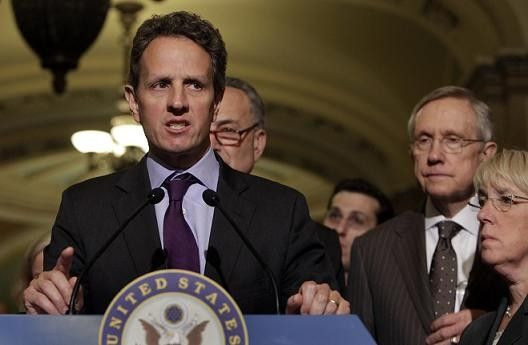Geithner: Default Jeopardizes 80M Monthly Payments

Analysis
U.S. Treasury Secretary Timothy Geithner reiterated Sunday that if Congress does not raise the U.S. debt ceiling up to 80 million federal payments and checks this month -- including Social Security payments -- will be jeopardized.
Only Congress has the ability to make sure the American people get their payments on time, Geithner said on Fox News Sunday with Chris Wallace.
We write 80 million checks a month, Geithner said, Fox News reported Sunday. There are millions and millions of Americans that depend on those checks coming on time. Not just people that supply our military, but people who get Social Security benefits, Medicare, Medicaid benefits. And we cannot put those payments at risk, and we do not have the ability to limit the damage on them, if Congress fails to act in time.
As of Sunday at 4 p.m. EDT, Congressional Republicans and the Obama administration still had not reached an agreement on how much to cut the budget deficit by, while increasing the nation's debt ceiling.
Congress needs to raise the debt ceiling by Aug. 2, when the federal government both runs out of money and loses the authority to borrow more money.
Moreover, with less than 10 days to the default deadline, Geithner, among other monetary and fiscal officials, and market participants, are becoming increasingly worried that the stalemate risks roiling the financial markets.
Further, a U.S. Government default -- or even the hint of that fault- - would force institutional investors to 'price-in' the increased risk -- i.e. increase the interest rate it asks to hold U.S. debt.
In addtion, because the U.S. Government is considered the lowest risk in the world -- those higher interest rates -- or increased risk -- would ripple through the financial system -- pushing up interest rates on everything from home mortgages, to car loans, to credit cards and student loans, among other destructive consequences.
And higher interest rates will only further slow an already tepid U.S. economic recovery, and hurt global economic growth, Geithner and most economists agree.
As of Sunday afternoon, the major stumbling block in the debt talks appeared to be a difference regarding how much to raise the debt ceiling by.
Congressional Republicans want a short-term extension, then require President Obama to request another extension in 2012, an election year.
Congressional Democrats and Obama counter that the above is merely Republican 'theatrics' and 'playing politics with the federal budget' -- i.e. forcing a Democratic president to make a politically-difficult request in the middle of the 2012 president election campaign. Short-term debt limit increases also will do nothing to ease the long-term concerns of institutional investors, the Obama administration said.
Obama has repeatedly said he will veto any short-term debt increase if it is not attached to a comprehensive plan to both cut the deficit substantively for 10 years and raise the debt limit.
Theatrics aside, one of two debt deal plans appears to be emerging on Capitol Hill.
Over this weekend, Congress will forge a responsible path forward, Speaker John Boehner, R-Ohio, said Saturday. That suggests Boehner will attempt to gain support for Obama's grand bargain, albeit in a modified form, involving a 10-year, up to $4 trillion deficit reduction package with a debt limit increase.
If Boehner's effort does not gain support in his caucus, that would bring Senate Minority Leader Mitch McConnell's, R-Ohio, last-chance proposal, front-and-center. McConnell, who is working on the plan with Senate Majority Leader Harry Reid, D-Nev., would ask Congress to make up-front budget cuts, raise the debt ceiling, then establish a special, bipartisan, binding committee with exceptional powers, to implement additional deficit reduction measures.
Political/Public Policy Analysis: T-minus 9 days, and 7 hours and counting, until the default deadline, and as Geithner underscored, Congress needs to act, preferably by Monday morning, Washington time (EDT).
Financial markets are beginning to get concerned that the debt ceiling will not be raised. Therefore, it behooves Democrats and Republicans to forge a debt deal that also substantially cuts the deficit by Sunday night, or as soon as possible thereafter. The bond market could begin to get bumpy Monday, hence time is obviously of the essence.
With the above as a backdrop, there's been no substantive change in the talks since Boehner's return to the negotiating table late Saturday, hence we're keeping the risk barometer, on a scale of 0 to 100 percent, of the likelihood of a U.S. Government default, at 20 percent on Sunday afternoon, the same as it was on Saturday afternoon.
© Copyright IBTimes 2024. All rights reserved.





















